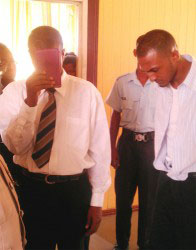As has been the case with several appeals recently coming up for hearing before the Guyana Court of Appeal, yet another attorney—on behalf of his clients, has attacked the sentencing structure of High Court judge, Navindra Singh.
At an appeal hearing yesterday afternoon, attorney Sanjeev Datadin questioned the basis for a combined 116-year jail sentence imposed by Justice Singh against his clients—Devendra Bushram and Christopher Singh.
Convicted and sentenced back in 2014 for the murder of Javed Mohamed, the duo in their appeal is arguing among other things, that the 66 and 50-year sentences handed down to them respectively by the judge is severe.

In an address before acting Chancellor Yonette Cummmings-Edwards and Justices of Appeal Rishi Persaud and Dawn Gregory, Datadin, as a number of his colleagues at the bar have been arguing in recent weeks, described Justice Singh’s sentencing formula as “arbitrary.”
He vehemently argued that there is no basis—in law or general practice, for the 60-year base from which the judge commenced sentencing against his clients
Following their conviction on November 20th, 2014, Justice Singh, as he usually does for persons convicted by a jury for the capital offence, commenced sentencing for each convict at a base of 60 years.
And as he also does, the judge would make additions for any aggravating factors and deductions for mitigating factors.
In the case of Christopher Singh, to the 60-year base, the judge added 10 years because it was he who struck the fatal blow. Four years were, however, deducted for the time the man had spent on remand awaiting trial.
The judge also commenced Bushram’s sentence at 60 years, but in mitigation, deducted six years as he had not struck the fatal blow, and an additional four years for time he had also spent on remand awaiting trial.
As a number of lawyers have done for some time, and attorneys Ronald Burch-Smith and Glenn Hanoman in more recent days—on behalf of their clients appealing sentences imposed by Justice Singh, Datadin said the reasoning behind the 60-year commencement base is unknown to anyone.
“The imposition of 60 years is for whatever reason, chosen by the judge which no one knows,” Datadin declared.
Against the background of his argument that the 60-year base is arbitrary, counsel said it would therefore mean that the sentence “cannot stand,” and would need to be more in keeping with what is the general norm in sentencing among other High Court judges.
The lawyer’s contention is that the base used by Justice Singh is contrary to what Parliament intended when it set life imprisonment as being the most severe “custodial” sentence a court can impose.
He essentially argued that a determinative sentence should therefore not be on the same wavelength as that of a life sentence—which he said was intended to be just that, a life sentence, though he pointed out the fact that some judges attach a term of years before which a convict may become eligible for parole, even though they may have imposed a life sentence.
Datadin said that considering his clients were both only 17 years old at the time of their conviction, the sentences visited upon them by Justice Singh could possibly see them being behind bars for as good as life.
Datadin opined that there seemed to have been no discount given by Justice Singh on the sentences for the age of the convicts whom he argued should not fall within the same category with adults.
Had the court considered that the appellants were juveniles, the lawyer said that the 60-year base could then not be right.
He reasoned that if juveniles should not be sentenced as adults, it would then mean that perhaps Justice Singh would then have to commence at a high base for sentencing the latter category of offenders convicted of murder.
Quickly noting, however, that this too would not be reasonable or right, Datadin said that it was for such reasons that Justice Singh’s base number and his lack of reason for that base, remains uncertain and “bad.”
Counsel made the case that even though remission was granted for time spent on remand, regard ought to have been given for the age of the convicts and further deductions made accordingly.
He opined too, that the court, though not done in every instance and is not bound to, could have nonetheless ordered a probation report since the convicts were so young.
Justice Cummings-Edwards had enquired from Datadin whether the attorney who represented the then teens during the trial had requested a probation report.
He answered by saying that while the records do not so reflect, the court could have exercised its wisdom and so ordered, given the age factor of the convicts, while adding that it is the practice for probation reports to be presented before sentencing juveniles.
Also raised as a ground on which the young men are appealing, is their complaint that the trial judge did not sufficiently direct the jury on how to treat with the murder-felony rule.
When the case continues on January 22nd of next year, Datadin will continue his arguments on this legal principle which he in part argues offends fundamental rights provisions guaranteed under the constitution.
After Datadin concludes his submissions, Prosecutor Dionne McCammon will then present the state’s arguments.
Twenty-three-year-old Mohamed of 636 Best Plantation, West Coast Demerara had been robbed, brutally beaten and fatally stabbed by the two men.
He had been returning home when he was attacked, after attending a floodlights cricket match with some friends at Better Hope, East Coast of Demerara.






